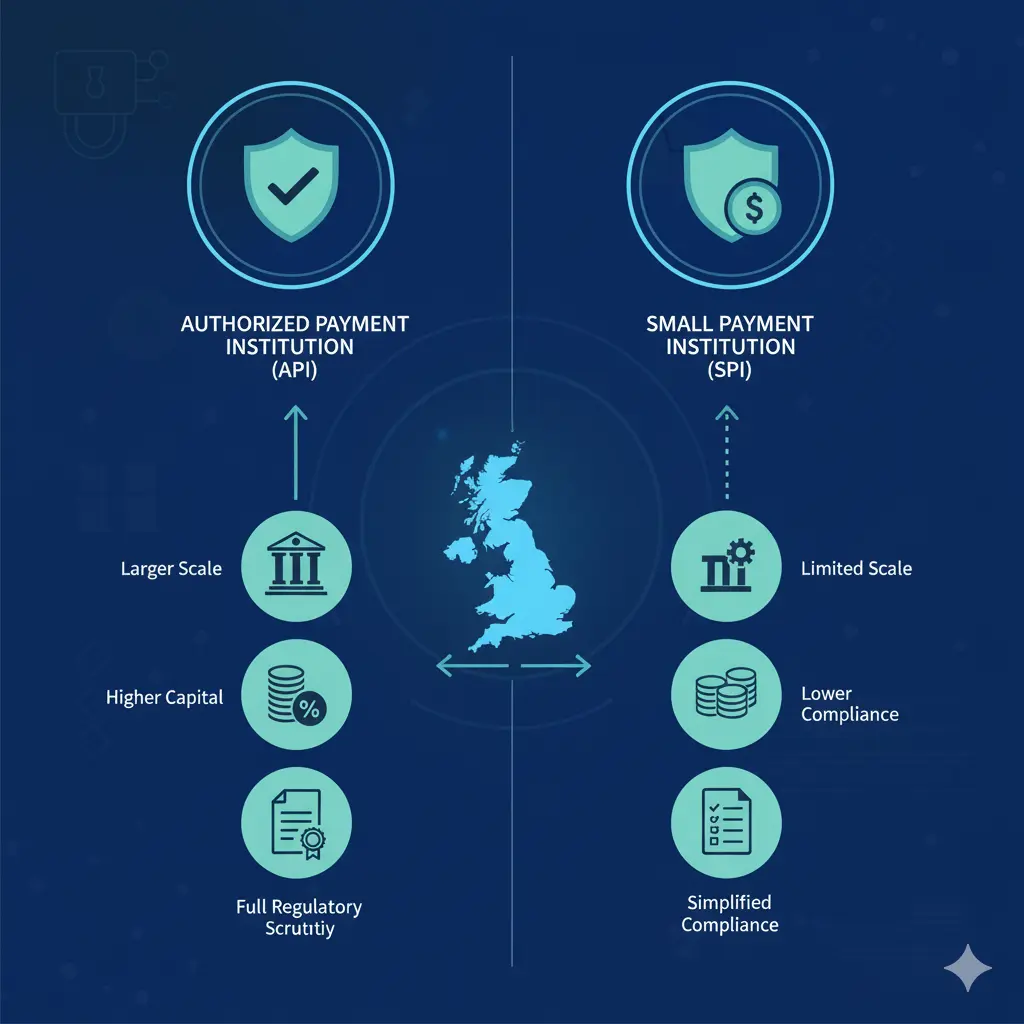
The UK remains one of the world’s most mature and opportunity-rich markets for payment service providers. Whether a business wants to launch a remittance platform, digital wallet, FX service, merchant payouts engine, or a neobank layer, it must operate under the regulatory umbrella of the Financial Conduct Authority (FCA). Two licensing options dominate the landscape:
An Authorized Payment Institution (API) is a fully licensed payment provider under the UK Payment Services Regulations 2017 (PSRs). It offers the broadest level of payment service permissions and may also passport services across the EEA (subject to post-Brexit rules). APIs are chosen by companies that require enterprise-grade payment capabilities and full operational flexibility.
API authorization delivers maximum capability but comes with strict FCA scrutiny, detailed documentation, proven governance structures, and strong safeguarding and AML/CTF systems.
A Small Payment Institution (SPI) is a lighter and more accessible payment registration for fintechs with limited transaction volumes. It is ideal for businesses launching an MVP, testing product–market fit, or operating within a controlled monthly processing limit.
Many companies start as SPIs to build operational maturity before upgrading to full API licensing.
APIs and SPIs differ significantly in scope, regulatory oversight, and scalability. Below is a summary that shows why APIs are ideal for scaling, while SPIs serve early-stage payment models.
API applicants must meet stringent FCA conditions that demonstrate operational resilience, compliance maturity, and governance capability across all payment-related activities.
All APIs must safeguard customer funds through segregated accounts or approved insurance mechanisms. They must also hold adequate initial capital depending on the services they offer—aligned strictly with FCA and PSR standards.
SPI approval is more accessible but still requires compliance with UK Money Laundering Regulations, responsible governance, and a defined operational model.
The decision between SPI and API depends on a firm’s growth trajectory, funding strategy, and long-term payment model.
SPI is suitable for firms that want a simple, faster entry into the payments ecosystem.
API is the right choice for businesses with ambitious growth plans and regulated service requirements.
Many fintechs intentionally start as SPIs and upgrade to API once they gain financial resilience, compliance maturity, and FCA supervisory familiarity.
The FCA prioritizes security, governance, and customer protection over commercial opportunity. Strong compliance frameworks dramatically increase approval success.
Both SPI and API firms must maintain accurate reporting, AML checks, transaction monitoring, and audit trails. A robust platform is essential for meeting FCA expectations.
RemitSo provides the compliance backbone required for payment institutions through automated KYC, AML monitoring, audit trails, multi-currency tools, and risk management frameworks.
Choosing between SPI and API is a critical strategic decision. SPIs offer a low-barrier entry, while APIs provide enterprise scalability, broad permissions, and cross-border capability. Regardless of the path, strong governance, AML controls, and operational resilience are non-negotiable for long-term success.
Want to see how a ready-made platform can accelerate your growth?
Book a demo or consult with us at RemitSo today to see how our platform can power your growth.
An API can operate without transaction volume limits and may expand across the EEA through structured licensing. An SPI is restricted to the UK and limited to €3 million monthly transaction volume.
Yes. Many firms start as SPIs to reduce early compliance burden, then upgrade to API once their governance, operations, and compliance frameworks are more mature.
No. SPIs cannot offer Payment Initiation Services (PIS) or Account Information Services (AIS).
Yes. APIs must hold adequate initial capital as required under the UK Payment Services Regulations. (Specific pricing not included as per your request.)
Timelines vary based on: – Completeness of documents – Governance strength – FCA processing workload Firms with stronger compliance foundations progress faster.
Common reasons include: – Weak AML frameworks – Insufficient safeguarding – Unclear business model – Incomplete documentation – Lack of experienced management
Yes. Both SPI and API firms must comply with UK Money Laundering Regulations and maintain effective AML/CTF systems, monitoring, and controls.
A remittance management system strengthens licensing applications by standardizing KYC, AML monitoring, reporting, audit trails, and safeguarding workflows — all critical for FCA approval and ongoing supervision.

